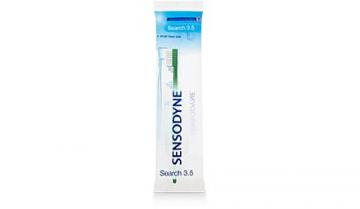
Sensodyne Search 3.5 Toothbrush (Green) is a compact soft toothbrush that is designed for people with sensitive teeth. This Sensodyne toothbrush features gentle round filament ends to help prevent gum damage. Its slim neck affords easy access to all areas of the mouth and its handle provides a comfortable grip. It is recommended that toothbrushes are replaced every 3 months.
Product Features:
- Compact toothbrush
- Gentle, round filament ends
- Slim neck
- Broad handle
What Causes Sensitive Teeth?
Dentine hypersensitivity, or tooth sensitivity, is a common dental problem. It’s a condition that can develop over time, as a result of common problems such as receding gums and enamel wear. Most sufferers are between 20 and 50 years old. Tooth sensitivity can start to happen when the softer, inner part of the tooth called ‘dentine’ becomes exposed. Dentine lies under the enamel and the gums.
Thousands of microscopic channels run through the dentine towards the centre of the tooth. Once the dentine is exposed, external triggers (such as a cold drink) can stimulate the nerves inside the tooth, resulting in the characteristic short, sharp pain of tooth sensitivity.
Why Do My Teeth Hurt?
If you’ve ever winced after an unwelcome twinge of tooth sensitivity, you’re not the only one. But remember, there can be many different causes of dental pain, other than tooth sensitivity. So if you are feeling any tooth pain or discomfort, especially if it persists, the best thing you can do is visit your dentist and seek professional advice.
Reasons for tooth pain
Tooth Decay
Pain caused by tooth decay (dental caries) can feel similar to tooth sensitivity. Tooth decay happens when the sugars in foods and drinks react with the bacteria in the plaque on our teeth to form acids. These acids can gradually soften and erode your enamel and dentine. Brushing twice a day with fluoride toothpaste will help to strengthen your teeth.
The problem with tooth decay is that you might not feel any pain from it until it’s quite advanced. It can be treated in the early stages. So, even if you don’t feel any pain, it’s important to go for regular dental check ups so that your dentist can spot early signs of tooth decay and work with you to treat it.
Teeth Whitening
Many people experience tooth sensitivity during, and for a period after teeth whitening treatments. By teeth whitening, we mean professional treatments applied under the supervision of a dentist that uses bleaching ingredients.
The sensitivity that can be experienced during and after a bleaching treatment is different from dentine hypersensitivity. The bleaching component in the product is believed to pass through the enamel and dentine and enter the pulp at the centre of the tooth, where it can cause inflammation and temporary sensitivity.
After Treatment
It is not uncommon for your teeth to feel sensitive for a time after having dental treatment. However, if this persists contact your dentist for advice. Other common causes of tooth pain include dental abscesses and cracked teeth. It is important to visit your dentist regularly to check the health of your teeth and gums. If you feel and pain or discomfort, particularly if it persists, contact your dentist for advice.
-
Directions
For effective cleaning of your teeth and gums, we recommend twice daily brushing with a fluoride toothpaste and a Sensodyne toothbrush. -
Storage Information
Do not store above 25cDo not store above 25c, away from direct sources of heat and humidity. Keep in original container
